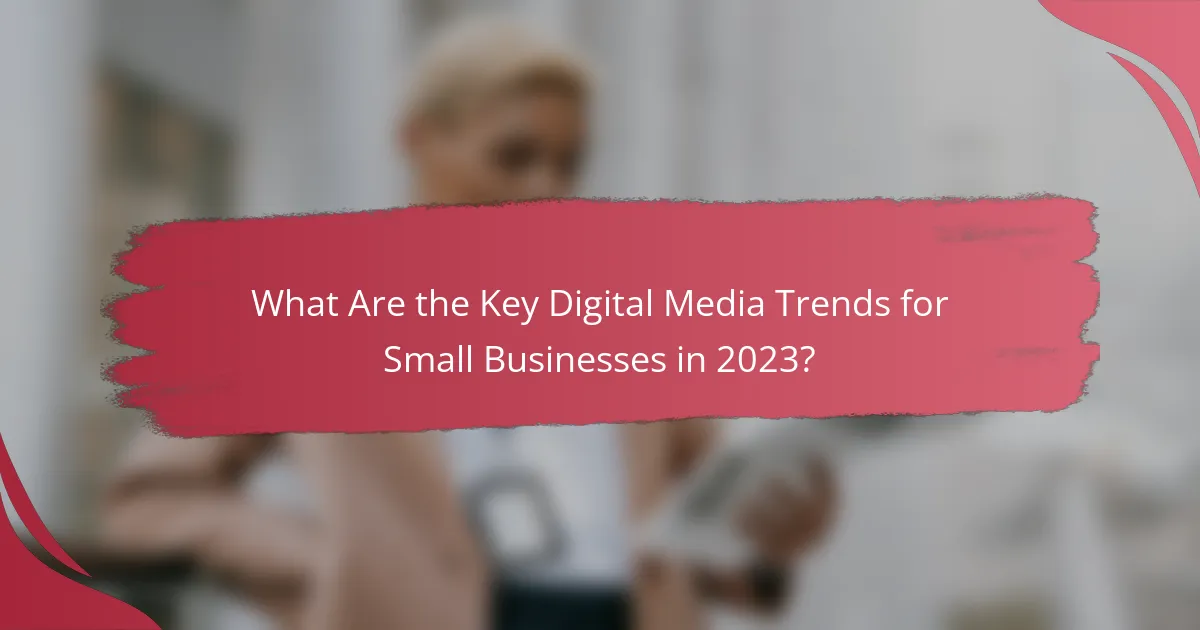In 2023, small businesses are navigating transformative digital media trends that can significantly improve their marketing strategies. By embracing video content, social commerce, personalized marketing, influencer partnerships, and sustainable branding, small business owners can effectively engage customers and drive sales. Understanding and adapting to these trends is essential for staying competitive in today’s dynamic marketplace.

What Are the Key Digital Media Trends for Small Businesses in 2023?
In 2023, small businesses are seeing significant shifts in digital media trends that can enhance their marketing strategies. Key trends include the increased use of video content, the rise of social commerce, a focus on personalized marketing, growth in influencer partnerships, and an emphasis on sustainability in branding.
Increased use of video content
Video content is becoming essential for small businesses, as it captures attention more effectively than static images or text. Platforms like Instagram and TikTok are driving this trend, with short, engaging videos often yielding higher engagement rates.
Small businesses should consider creating product demos, behind-the-scenes footage, or customer testimonials in video format. Aim for videos that are concise, ideally under two minutes, to maintain viewer interest.
Rise of social commerce
Social commerce is transforming how small businesses sell products directly through social media platforms. Features like Instagram Shopping and Facebook Shops allow businesses to showcase products and facilitate purchases without leaving the app.
To leverage social commerce, ensure your social media profiles are optimized for shopping. Use high-quality images and clear calls to action to guide users through the purchasing process.
Focus on personalized marketing
Personalized marketing is crucial for small businesses aiming to connect with customers on a deeper level. Tailoring messages and offers based on customer behavior and preferences can significantly enhance engagement and conversion rates.
Utilize data analytics tools to segment your audience and create targeted campaigns. Simple tactics include personalized email greetings or product recommendations based on past purchases.
Growth of influencer partnerships
Influencer partnerships are increasingly popular among small businesses seeking to expand their reach. Collaborating with influencers who align with your brand can help you tap into new audiences and build credibility.
When selecting influencers, consider their engagement rates and audience demographics to ensure a good fit. Micro-influencers, who often have more dedicated followings, can be particularly effective for small businesses.
Emphasis on sustainability in branding
Consumers are increasingly prioritizing sustainability, making it essential for small businesses to incorporate eco-friendly practices into their branding. This trend can enhance brand loyalty and attract environmentally conscious customers.
Consider adopting sustainable materials, reducing waste, or supporting local suppliers. Clearly communicate your sustainability efforts through your marketing channels to resonate with your audience.

How Can Small Businesses Leverage Video Content?
Small businesses can leverage video content to enhance their marketing efforts, engage customers, and showcase products or services effectively. By utilizing various video formats and platforms, businesses can reach wider audiences and create a more personal connection with potential customers.
Utilizing platforms like TikTok and Instagram Reels
Platforms like TikTok and Instagram Reels are ideal for small businesses looking to create short, engaging videos that capture attention quickly. These platforms favor creative content that resonates with younger audiences, making them perfect for brand storytelling and viral marketing.
To succeed, focus on trends and challenges relevant to your niche. For example, a local bakery might share quick recipes or behind-the-scenes clips of their baking process. Regular posting and interaction with followers can significantly boost visibility and engagement.
Creating engaging tutorials and product demos
Creating tutorials and product demos allows small businesses to showcase their expertise and demonstrate how their products work. These videos can help potential customers understand the value of a product and how it fits into their lives.
Keep tutorials concise, ideally under five minutes, and ensure they are visually appealing. For instance, a gardening shop could produce a series of videos on planting techniques, featuring their products in action. Including clear calls to action can encourage viewers to make a purchase.
Incorporating live streaming events
Live streaming events provide an interactive platform for small businesses to engage with their audience in real-time. This format allows for Q&A sessions, product launches, or virtual tours, creating a sense of community and urgency.
When planning a live event, promote it in advance across your social media channels. Consider using tools like Facebook Live or Instagram Live to reach your audience directly. Ensure you have a stable internet connection and prepare a loose script to keep the event flowing smoothly.

What Are Effective Strategies for Social Commerce?
Effective strategies for social commerce include leveraging social media platforms to facilitate shopping experiences directly within their interfaces. This approach enhances customer engagement and can significantly boost sales for small businesses.
Integrating shopping features on social media platforms
Integrating shopping features on platforms like Instagram and Facebook allows businesses to create seamless shopping experiences. By utilizing tools such as product tags and shop tabs, customers can browse and purchase products without leaving the app.
Consider setting up a Facebook Shop or Instagram Shop to showcase your products. Ensure that your inventory is well-organized and that product descriptions are clear to facilitate easy navigation and purchasing.
Utilizing user-generated content for authenticity
User-generated content (UGC) enhances authenticity and builds trust among potential customers. Encouraging customers to share their experiences with your products can create a sense of community and provide social proof.
Share UGC on your social media channels by reposting customer photos or reviews. This not only showcases your products in real-life settings but also encourages more customers to engage and share their own content.
Implementing shoppable posts and ads
Shoppable posts and ads allow businesses to tag products in their content, making it easy for users to purchase directly from their feeds. This feature streamlines the buying process and can lead to higher conversion rates.
When creating shoppable content, ensure that the visuals are high-quality and that the product information is accurate. Test different formats and placements to see what resonates best with your audience, and monitor engagement metrics to optimize your strategy.

What Role Does Personalization Play in Digital Marketing?
Personalization in digital marketing is crucial for engaging customers and enhancing their experience. By tailoring content and offers to individual preferences, businesses can increase conversion rates and customer loyalty.
Using data analytics for targeted campaigns
Data analytics allows small business owners to identify customer behaviors and preferences, enabling targeted marketing campaigns. By analyzing data from various sources, such as website interactions and social media engagement, businesses can segment their audience effectively.
Consider using tools like Google Analytics or customer relationship management (CRM) software to gather insights. Focus on key metrics such as customer demographics, purchase history, and online behavior to refine your campaigns.
Creating personalized email marketing strategies
Personalized email marketing involves crafting messages that resonate with individual recipients based on their interests and behaviors. Start by segmenting your email list according to customer data, such as past purchases or engagement levels.
Utilize dynamic content in your emails, which changes based on the recipient’s profile. For example, include product recommendations tailored to previous purchases or personalized discounts. Aim for open rates above 20% and click-through rates of 2-5% to gauge effectiveness.

How Can Small Businesses Collaborate with Influencers?
Small businesses can effectively collaborate with influencers by identifying individuals who resonate with their target audience and aligning their brand values. This partnership can enhance visibility and credibility, driving engagement and sales.
Identifying niche influencers in their market
To find the right influencers, small businesses should focus on those who specialize in their specific industry or niche. Look for influencers who have a genuine connection with their audience and create content that aligns with your brand’s message.
Utilize social media platforms and influencer marketing tools to discover potential partners. Check engagement rates and audience demographics to ensure they match your target market. For example, a local bakery might collaborate with food bloggers who emphasize artisanal products.
Building long-term partnerships for brand loyalty
Establishing long-term relationships with influencers can foster brand loyalty among their followers. Instead of one-off promotions, consider ongoing collaborations that allow influencers to authentically represent your brand over time.
Communicate openly with influencers about your goals and expectations. Offer them exclusive deals or early access to new products, which can incentivize them to promote your brand consistently. This approach not only strengthens the partnership but also builds trust with their audience.



